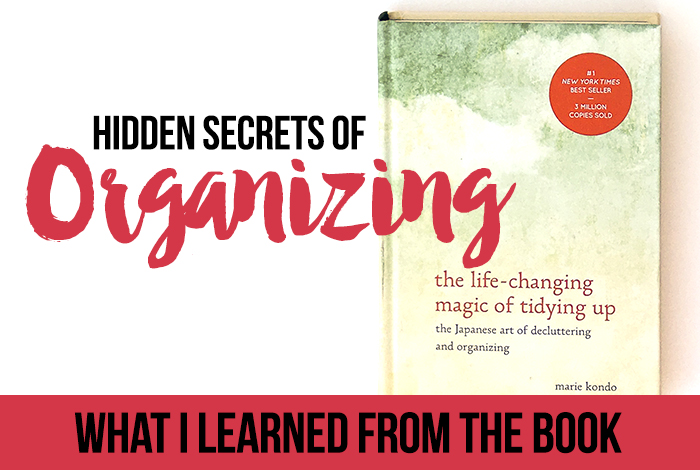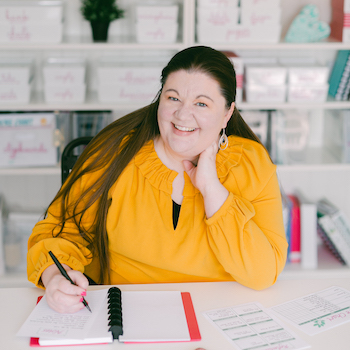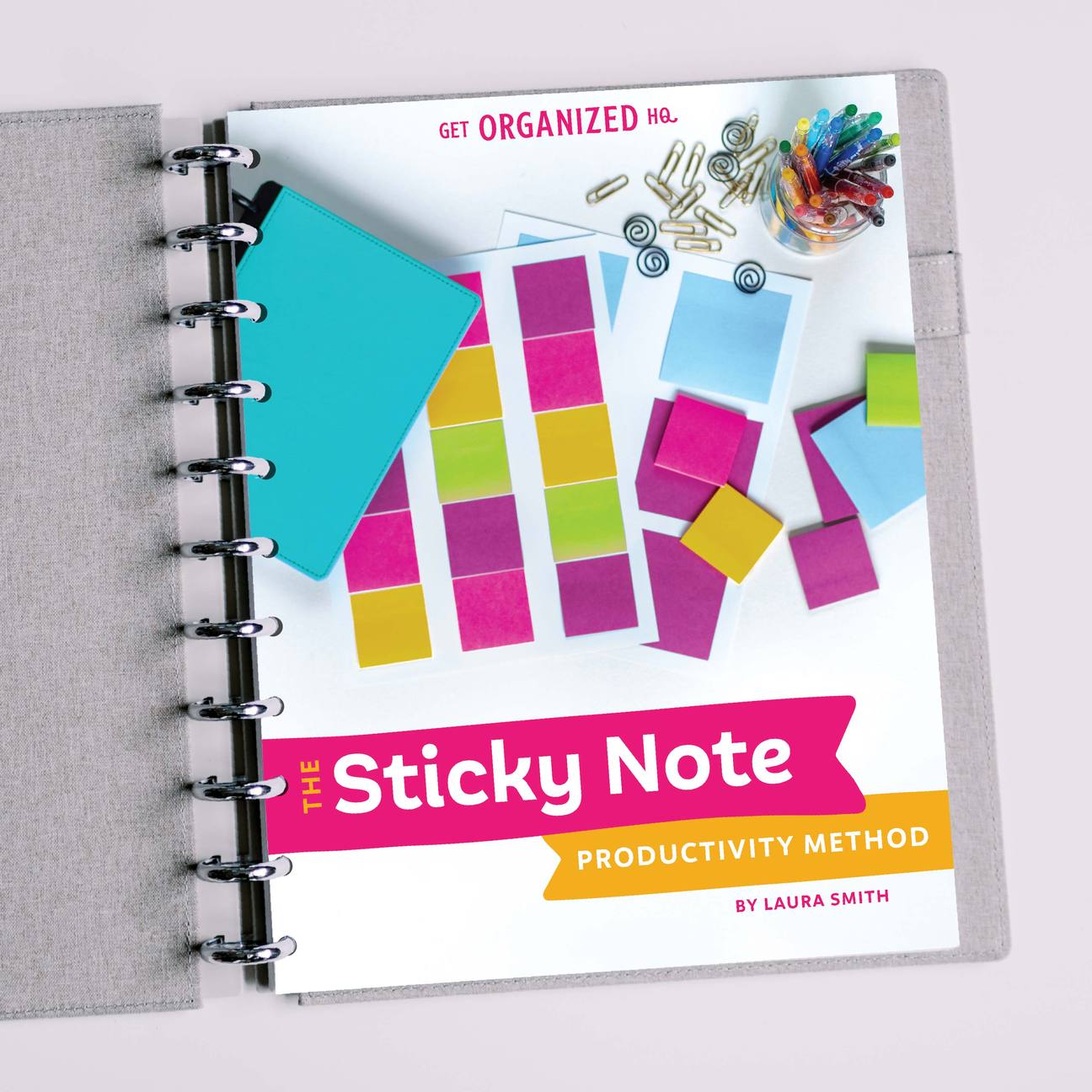Hidden Secrets of Organizing
Last week I shared what I disagreed with from the book The Life Changing Magic of Tidying Up. This week I want to share what I love about the book. If you haven't read it, I definitely recommend doing so. It's a pretty quick and easy read, and I think you'll come away feeling inspired and motivated to declutter and organize.
This post contains affiliate links. For more info, read my disclosure here.
The video below is a recording of a Periscope I did about this topic (follow me there at @iheartplanners). If you'd prefer to read rather than watch the video, I have the same information written below the video:
Organize your home “all at once”
The book recommends get your home organized all in one go. She clarifies that by “all in one go”, it takes most people about six months. I found this perspective a refreshing change from all the “do a little each day” advice that I typically see. Personally, I think either the all-at-once or a-little-each-day approach can work, but I think the all at once approach is often overlooked and overrated. I find that it's often easier and more efficient to get on a decluttering roll and keep on going. Plus that way you will very quickly see dramatic changes, which will help keep you motivated.
Put everything in a pile and choose what to keep
She recommends decluttering by category and placing everything from one category in a big pile. From there, pick up each item and keep only those things that “spark joy.” I love the concept of choosing which items to keep rather than just glancing through things and deciding what to get rid of.
Guilt free discarding
Since she recommends keeping items that spark joy, there's no guilt in discarding things that don't do that. She also says that even things you never used (like a shirt with the tags still on) have served a purpose (such as teaching what styles don't work for you), so there's no need to feel guilty getting rid of them.
Everything needs a place
She encourages you to find a designated space in your home for every single item. I think this is definitely key to keeping your home tidy. If you take a look at any extra clutter lying around your home, I bet most of it doesn't have a designated spot.
Don't spend too much time organizing things you don't use often
I love how she recommends not spending much time or effort organizing papers. She says you rarely ever need to access them, so they should all have one file. I think this is a great point. I know I've spent a lot of time organizing papers that I never touched again. It might not be worth spending lots of time organizing them.
Leave a comment below or in the Facebook group letting me know if you've read the book and your thoughts on it.
Get Organized

Sign up to receive the free Get Organized Once and For All ecourse.









 Copyright 2024, Get Organized HQ.
Copyright 2024, Get Organized HQ.
Maryam Says
Hi Laura,
I like the fact that ‘everything needs a place’, which makes sense to me why things easily get cluttered. Plus, I appreciate the idea of focusing on what to keep rather than what to get rid of.
Thanks for your sharing 🙂
LauraJane Says
Post authorYes, I think giving everything a place is a huge help.
Lorre Hopkins Says
In my home “everything needs a place” has been the clue to me that I need a garage sale because I am busting at the seams and everything can’t find place. Things are sitting on my counters that need to be put away but my cupboards are full. I’m not very good at making the best use of storage and I often don’t know where to put stuff. Either way, I am in a mindset to clear out the things that take up the space that the things I need should go.
LauraJane Says
Post authorSounds like a great plan.
Julie Says
I loved this book! Sure, there’s plenty I disagreed with (I don’t thank my cloths or empty my purse daily) but there were just a few concepts that totally changed everything for me. I love the approach of handling one thing at a time and choosing what to keep instead of what to get rid of. My old method of looking at a bunch of things at once and choose a few things to toss just didn’t work and this really does. My favorite is the idea of decluttering by category, and doing each category all at once. What a game changer! It makes so much more sense than cleaning by location – I can’t believe I never thought of it before. In fact, I’m about to read it again to get more inspiration and to remember anything I’ve forgotten!
Jessica Says
I really like this book. I’m not taking all of it, but it really simplifies difficult decisions on what to keep and what to let go. I used to think I needed to have identical cups, plates, glasses, etc. to receive for meals, but I actually liked my unique plates, cups and glasses better. Keeping both types was too much, in particular when I hardly use them. Now I barely have assorted dishes, but for glasses it’s actually even more useful, as you’re sure not to mix up yours with your neighbors’.
Same with my clothes. Being brought up by a very anxious mom, I always thought I needed to have clothes for every single weather situation. Now I hardly own any clothes I don’t like and though I got rid of a lot of warm clothes, I always find a way to dress warm enough with the clothes I have kept. And if I am a little cold one day, well, it probably reinforces my immune system.
I also apply this for what I take with me. I used to carry around so much stuff, just in case. Now I don’t always carry an umbrella, so I sometimes get wet, but once I am back home the trouble is over, and I realise it’s not such a big deal to be wet. We tend to think we really need a whole lot of stuff, that we’re better off the more we possess, but if all those objects burden us – literally or mentally – they actually take away some of the joy in life.
The idea of keeping only things that bring joy scared me at first, but the more I try it out, against my intellectual reasoning, the more I realise that what I think is logic to keep doesn’t have to be. Well, on the other hand I am still looking for a use for some wonderful items I possess, that definitely bring me joy just by looking at them. I have beautiful bowls of all sizes, if anyone has an idea how I could use them all, I’m taking it. I mainly need bowls for cereal, but I have bigger and smaller bowls I hardly use because they’re too big or too small. At some point I might as well donate them. It is sometimes easier to get rid of something we’re sure someone else would like to have rather than some broken object that only has value in our eyes.
Now that I have worked through the less sentimental stuff, I can imagine myself reducing my photo collection a lot, which at some point was unimaginable to me. I always felt that keeping an object that reminded me of something was absolutely necessary to not forget about that event, but I see now that it is not true. Letting go of objects that represented joy in the past, actually pushes to seek joy in the future instead of dwelling on some past happiness.
I’ve reduced my decorative stuff collection a lot. I used to have so many things that I could not really appreciate the ones I like the most. Now that all of them are out and visible, I even feel I can still regularly reduce it, as once I’ve seen one of the items often enough, I can let go of it, replacing it by a new one, or just having a less crowded wall or cupboard.
I used to have a ton of books. I would keep them because at some point I had bought them and I had put my money into them, but the majority are just on a shelf and take up space. Now I have reduced all my different reading topics to a quite low number in my eyes. I hardly kept any novels, as I have a great memory and barely feel the need to read a book again, even many years after I have read it. I’m studying science, but I’ve now reduced my books to the essential basics and the stuff I work on currently.
I used to have tons of spiritual material, personal notes, lecture notes, but after years of just keeping them in boxes and on shelves, I realized that what Marie Kondo said is true: Once a talk is over, we barely look at the notes connected to the talk anymore. The same is true for my personal notes. I think I need to keep them, but actually they are often in a very bad handwriting, and though at some point I felt I needed to write my thoughts down, I see that it is not necessary to keep those notes. Writing them down to have a more organized thinking was the main purpose, the thoughts are still in me, they don’t just get lost. And I must admit, I kind of overcame the thought that someday I might be famous and that everyone would fight for ebery single scrap of paper I’ve ever written on…=) Now I only own spiritual books that are nice externally and that I am much more likely to pick up from a shelf and read if I’m looking for some spiritual guidance. And I still own more than I have time to actually read.
I used to keep every single letter I ever received, even post it’s stuck to a present, can you imagine? Now I see that what was important was the joy I had receiving it. And even more the friendships I have now.
I have no more pyjamas, only two night dresses, and I don’t need more.
I try to apply the folding method. It seemed completely crazy to me at first. I barely have any drawers, only shelves. I just use simple mail boxes. It does seem good to be able to see everything, without having to take of a clothe that is on top of another one, and in particular not to have my pile falling over as I take out a T-shirt from the bottom of my pile.
I’m curious about what she says about kids handling their stuff from the age as early as three, as mine are 3 and 5. I’ve applied the method to their clothes and toys, but checking whether they give me joy, whereas ideally it should give joy to them. They would probably keep every toy they have, but I am scared, they might get rid of some “valuable” toy. I’m not ready for it.. But it must be good education for them.